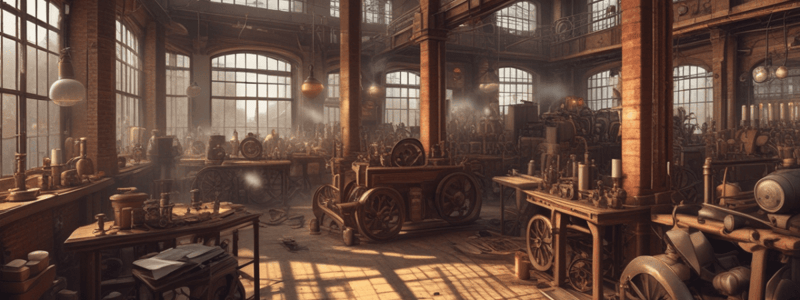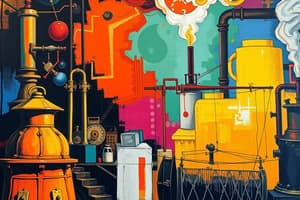Podcast
Questions and Answers
What technological advancement revolutionized industries and transportation during the Industrial Revolution?
What technological advancement revolutionized industries and transportation during the Industrial Revolution?
- Steam engine (correct)
- Water frame
- Spinning mule
- McCormick Reaper
Which invention brought textile manufacturing knowledge to the United States in 1793, sparking the Second Industrial Revolution?
Which invention brought textile manufacturing knowledge to the United States in 1793, sparking the Second Industrial Revolution?
- Cotton gin
- Spinning Jenny (correct)
- Water frame
- McCormick Reaper
Which industry saw significant advancements with the rise of steel and steam engines during the Industrial Revolution?
Which industry saw significant advancements with the rise of steel and steam engines during the Industrial Revolution?
- Communication industry
- Textile industry
- Transportation industry (correct)
- Agricultural industry
What communication advancement was introduced for messaging during the Industrial Revolution?
What communication advancement was introduced for messaging during the Industrial Revolution?
Which movement gained momentum during the Industrial Revolution period to advocate for workers' rights?
Which movement gained momentum during the Industrial Revolution period to advocate for workers' rights?
Flashcards are hidden until you start studying
Study Notes
- Industrial Revolution in Britain from 1760s to 1840s transformed manufacturing with new machinery like the water frame, spinning jenny, and spinning mule in the textile industry.
- James Watt's steam engine revolutionized industries and transportation, leading to faster production and travel using steam power.
- Samuel Slater brought textile manufacturing knowledge to the U.S. in 1793, sparking the Second Industrial Revolution with textile factories in the North.
- Agricultural advancements during the late 1700s and 1800s included inventions like the cotton gin, McCormick Reaper, steel-tipped plow, and thresher.
- Transportation industry saw the rise of steel and steam engines, with railroad lines, roads, and canals improving travel times significantly.
- Communication also advanced with the use of Telegraph Wire for Morse code messaging and Alexander Graham Bell's invention of the telephone in 1876.
- Harsh working conditions in factories during the Industrial Revolution included long hours, low wages, lack of rights, dangerous environments, and the extensive use of child labor.
- Labor unions formed to advocate for workers' rights, child labor laws were implemented, and movements like the Abolitionist and women's rights movements gained momentum during this period.
Studying That Suits You
Use AI to generate personalized quizzes and flashcards to suit your learning preferences.




